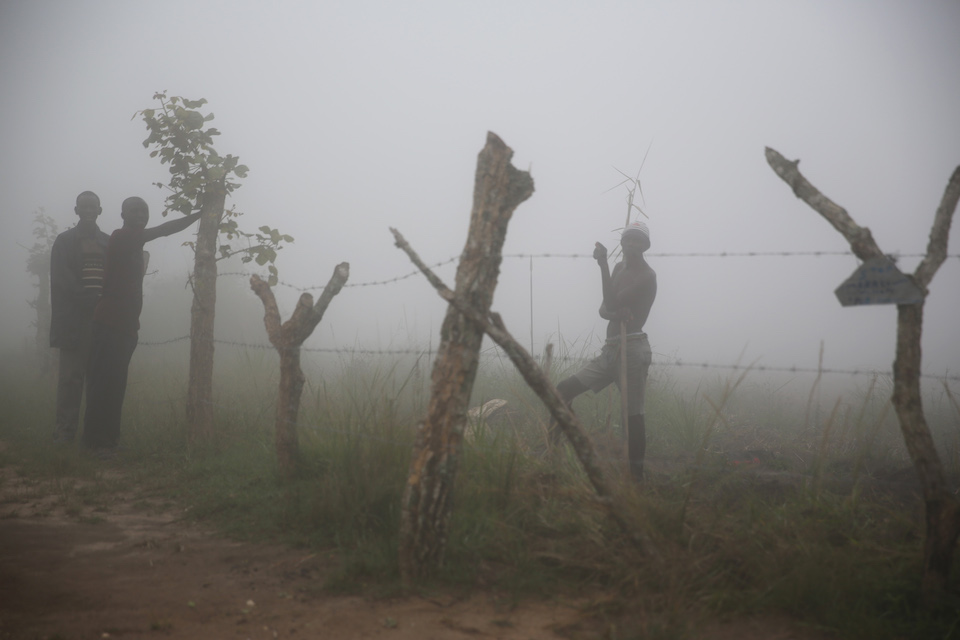"It’s clear that our message simply isn’t getting through to the Government of the DRC. The killings have continued, the horror has continued."
Statement by Stephen Hickey, Political Counsellor at the Permanent Mission of the United Kingdom to the United Nations, at the Security Council briefing on the Democratic Republic of the Congo.

Thank you Mr President.
I wouldn’t normally take the floor ahead of consultations, but as both Under-Secretary-General Lacroix and the Ambassador of France have expressed so clearly, these simply aren’t normal times for the people of the Democratic Republic of the Congo.
Indeed, for many people in the Kasai region these are the darkest moments of their lives.
The reports emanating from this region should send a shiver down each and every spine in this room. They are reports that bear all the hallmarks of the very worst of humanity; mass killings, beheadings, mass graves, millions displaced.
Sadly, as highlighted by the Secretary-General’s Advisor on Genocide, the government’s own security forces are responsible for much of this death and destruction in certain areas of the Kasai provinces. Nearly a hundred children have been maimed and killed by their own government’s forces and children have been sexually abused by government forces.
This represents a wider, worrying trend - the Secretary-General reports that 60% of 1,444 human rights violations and abuses recorded in the DRC over the past 3 months were committed by government forces - the same government that bears the primary responsibility to protect its citizens.
When faced with hell, people should be able to look to their government in hope. For the people of the Kasai, they do so only in fear.
This does not mean that the militia operating in these areas are innocent. Not by any stretch of the imagination. As we heard from USG Lacroix, they too are responsible for rape, killing, and high levels of child recruitment.
It is clear that the situation in the DRC compels us all to take a stand. That’s why we welcome the international investigation mandated by the Human Rights Council last month. It must start as soon as possible and be conducted to international standards of independence and transparency. We urge the Government to cooperate fully with this investigation; those responsible for these horrific crimes must be held to account.
Sadly, Mr President, the situation in the Kasai is by no means an isolated example in the DRC. There is also renewed violence in the east of the country, much of which has a worrying ethnic dimension. Such violence, in different areas of DRC, only further reinforces our belief that political uncertainty and instability in Kinshasa is fuelling violent uncertainty and violent instability across the country. And this is now presenting a serious threat to regional stability.
We all know what needs to happen, Mr President, and the Ambassador of France set this out very clearly. The DRC Government knows what it needs to do; stop the violence; ensure accountability for the violations and abuses; implement the 31st December Agreement in full. As set out in this Agreement, elections should be held in six months. We simply must see progress that gives the Congolese people and the world the confidence that this will be realised. This is the issue that is fundamentally increasing frustration and tensions in the country.
To deliver on this, the Electoral Commission must release an electoral timetable setting a date for elections, in line with the 31st December Agreement and agree a budget, so that vital international funds can be released. Let me take the opportunity to welcome progress in electoral registration and the positive role played by MONUSCO in support of this. But this progress must continue – insecurity cannot be used as an excuse for further delay.
In truth, Mr President, none of this new. We’ve known what needs to happen for some time. It’s clear that our message simply isn’t getting through to the Government of the DRC. The killings have continued, the horror has continued. What has failed to continue is genuine implementation of the 31st December Agreement that laid the path toward elections. So it’s incumbent on all of us in this Council to do more.
With the eyes of the world looking on us today in open session, I ask all Council members to support a clear, unequivocal message: stop the violence; hold those responsible for violations and abuses to account; and implement the 31st of December Agreement in full without delay.
Thank you.